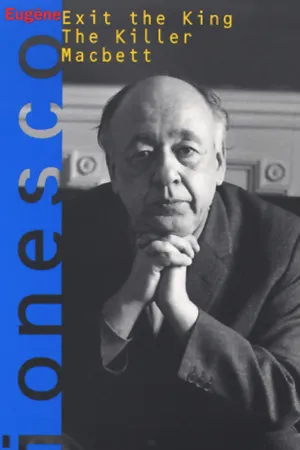![]()
THE KILLER
TRANSLATOR'S NOTE
An attempt has been made to reach a compromise between American and British English, but in the event of production, producers should feel themselves free to change any word that would obviously offend an audience.
Two cases in point would be: elevator/lift and prefect/monitor.
THE KILLER
First produced in Paris by José Quaglio at the Theatre Récamier, the 27th February, 1959.
CHARACTERS, VOICES, SILHOUETTES
(in order of appearance):
BÉRENGER, an average, middle-aged citizen.
THE ARCHITECT, of ageless, bureaucratic age.
DANY, young typist, conventional pin-up.
THE CLOCHARD, drunk.
THE OWNER OF THE BISTRO, middle-aged, fat, dark and hairy.
ÉDOUARD, 35, thin, nervous, darkly dressed, in mourning.
THE CONCIERGE (preceded by THE VOICE OF THE CONCIERGE), typical concierge.
VOICE OF THE CONCIERGE’S DOG.
A MAN’S VOICE.
SECOND MAN’S VOICE.
TRUCK DRIVER’S VOICE.
CAR DRIVER’S VOICE.
FIRST OLD MAN.
SECOND OLD MAN.
THE GROCER.
SCHOOLMASTER’S VOICE.
FIRST VOICE FROM THE STREET.
SECOND VOICE (GRUFF) FROM THE STREET.
THIRD VOICE (PIPING) FROM THE STREET.
FOURTH VOICE FROM THE STREET.
FIRST VOICE FROM BELOW.
SECOND VOICE FROM BELOW.
VOICE FROM THE RIGHT.
VOICE FROM ABOVE.
VOICE FROM THE LEFT.
SECOND VOICE FROM THE LEFT.
WOMAN’S VOICE FROM THE ENTRANCE.
SILHOUETTE OF A MOTORCYCLIST ON HIS BICYCLE.
POSTMAN’S VOICE (preceding the POSTMAN himself, if desired).
MOTHER PEEP.
VOICES OF THE CROWD.
THE DRUNK IN TOP HAT AND TAILS.
THE OLD GENTLEMAN WITH THE LITTLE WHITE BEARD.
FIRST POLICEMAN.
SECOND POLICEMAN.
THE ECHO.
THE KILLER.
STAGE DIRECTIONS
Several of these parts may be played by the same actors. More- over, it is probable that all the voices in the second act will not be heard. Any cuts required may be made in the first half of Act II: it will all depend on the effectiveness of these voices and their absurd remarks. The director can choose those he likes. He should, however, try if possible to obtain stereophonic sound effects. In the second act it is also better to have the greatest possible number of figures appearing in silhouette the other side of the window, as on a stage behind the stage. In any case, after the curtain has risen on the second act, some voices and sounds around the empty stage are indispensable, at least for a few minutes, in order to continue and in a way intensify the visual and aural atmosphere of street and city; this is first created at the end of Act I, fades after the arrival of Bérenger and returns again in force at the start of Act III to die right away at the end.
A few cuts could also be made in Act I, according to the power of the actor playing the part and his natural capacity to ‘put it over’.
Bérenger's speech to the Killer at the end of the play is one short act in itself. The text should be interpreted in such a way as to bring out the gradual breaking-down of Bérenger, his falling apart and the vacuity of his own rather commonplace morality, which collapses like a leaking balloon. In fact Bérenger finds within himself, in spite of himself and against his own will, arguments in favour of the Killer.
ACT ONE
No decor. An empty stage when the curtain rises. Later there will only be, on the left of the stage, two garden chairs and a table, which the ARCHITECT will bring on himself. They should be near at hand in the wings.
The atmosphere for Act I will be created by the lighting only. At first, while the stage is still empty, the light is grey, like a dull November day or afternoon in February. The faint sound of wind; perhaps you can see a dead leaf fluttering across the stage. In the distance the noise of a tram, vague outlines of houses; then, suddenly, the stage is brilliantly lit; a very bright, very white light; just this whiteness, and also the dense vivid blue of the sky. And so, after the grisaille, the lighting effects should simply be made up of white ‘and blue, the only elements in the decor. The noise of the tram, the wind and the rain will have stopped at the very moment the light changes. The blue, the white, the silence and the empty stage should give a strange impression of peace. The audience must be given time to become aware of this. Not until a full minute has passed should the characters appear on the scene.
BÉRENGER comes on first, from the left, moving quickly. He stops in the centre of the stage and turns round briskly to face the ARCHITECT, who has followed him more slowly. BÉRENGER is wearing a grey overcoat, hat and scarf. The ARCHITECT is in a summer-weight jacket, light trousers, open-necked shirt and with- out a hat; under his arm he is carrying a briefcase, rather thick and heavy, like the one ÉDOUARD has in Act II.
BÉRENGER: Amazing! Amazing! It's extraordinary! As far as I can see, it's a miracle. . . [Vague gesture of protest from the ARCHITECT.] . . . A miracle, or, as I don't suppose you're a religious man, you'd rather I called it a marvel! I congratulate you most warmly, it's a marvel, really quite marvellous, you're a marvellous architect!. . .
ARCHITECT: Oh. . . you're very kind. . .
BÉRENGER: No, no. I want to congratulate you. It's absolutely incredible, you've achieved the incredible! The real thing is quite beyond imagination.
ARCHITECT: It's the work I'm commissioned to do, part of my normal duties, what...
